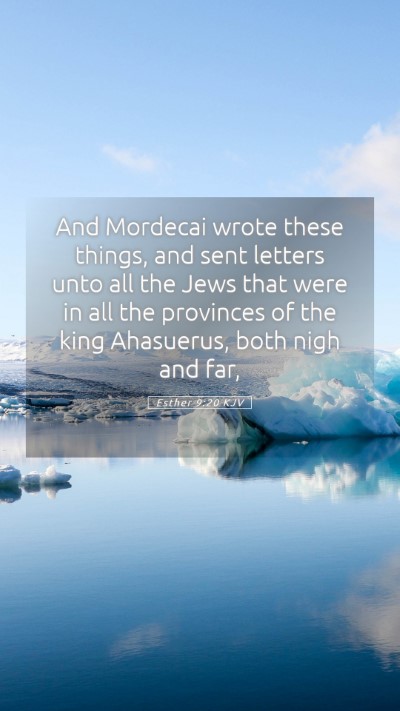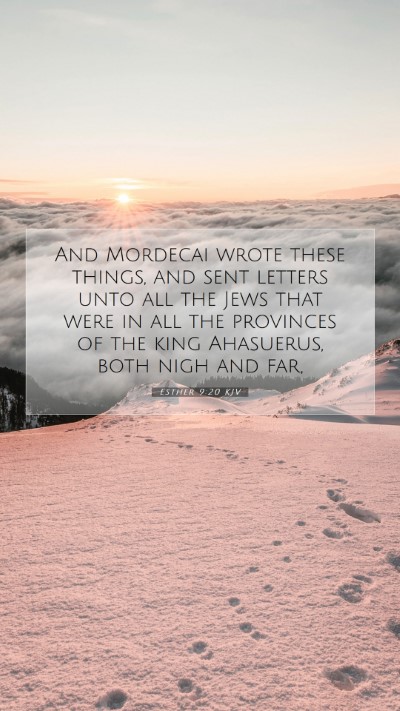Understanding Esther 9:20
Esther 9:20 reads, "And Mordecai wrote these things, and sent letters unto all the Jews that were in all the provinces of the king Ahasuerus, both nigh and far." This verse encapsulates an important moment in the narrative of the Book of Esther, where Mordecai, a key figure in the Jewish community, takes action to ensure that the events surrounding their deliverance from destruction are remembered and celebrated.
The Context of Esther 9:20
In this context, the Jews are celebrating their deliverance from a decree that sought their annihilation, and it is essential to appreciate the historical and cultural backdrop against which this letter was sent. This was a time of great danger for the Jewish people, and Mordecai's initiative in writing this letter speaks not only of the joy of their salvation but also of the need for unity among the Jewish diaspora.
Commentary Insights
-
Matthew Henry's Commentary:
Henry highlights the significance of Mordecai’s letters as a means of establishing a permanent reminder of the Jews' victory over their enemies. This act serves to create a lasting commemoration of God's deliverance and a celebration of the festival of Purim, which Mordecai instituted, emphasizing the importance of remembering God's faithfulness in times of distress.
-
Albert Barnes' Notes:
Barnes points out that Mordecai’s communication was an effort to rally all Jews, illustrating a strong sense of community and shared identity that transcends geographical boundaries. This verse thus indicates a critical movement towards solidifying Jewish practices and traditions in the face of adversity, as all were invited to partake in the joyous acknowledgment of their survival.
-
Adam Clarke's Commentary:
Clarke reflects on the logistics of Mordecai’s actions, indicating the meticulous effort it took to reach Jews throughout Ahasuerus' vast empire. This not only reveals Mordecai’s leadership capability but also signifies the widespread impact of the events recounted in Esther, encouraging Jews everywhere to celebrate their deliverance with feasting and gladness.
The Meaning of Esther 9:20
The primary meaning of Esther 9:20 is multifaceted, encompassing themes of remembrance, communal identity, and celebratory freedom. Mordecai's letters become a tool for educating future generations about the miraculous events that led to their salvation, serving both a practical purpose in strengthening bonds among the Jews and a spiritual purpose in fostering gratitude toward God.
Application of Esther 9:20
The verse challenges readers to consider how they commemorate their own spiritual victories and the importance of unity within their communities. Just as Mordecai encouraged the Jews to remember their deliverance, modern believers are called to remember and testify to God's work in their lives, which strengthens faith and fosters community.
Cross References
- Exodus 12:14: A command for Israel to keep the Passover as a lasting ordinance.
- Psalms 78:4: The importance of telling the next generation about God's mighty acts.
- Nehemiah 8:10: A reminder of the joy of the Lord as strength for the people.
- Daniel 9:2: Daniel remembers the prophecies concerning the desolation of Jerusalem.
- Acts 2:39: The promise of salvation for all who are called by the Lord.
Conclusion
Esther 9:20 serves as an excellent example of how Scripture can guide us in understanding the past, building a cohesive community, and celebrating moments of divine intervention. Through careful Bible verse interpretations, we glean bible study insights that are both historically rich and applicable to modern faith discussions. The verse is not just a historical account but a call to understand Scripture deeply and to actively engage in practices that reinforce our shared beliefs and thankfulness.


